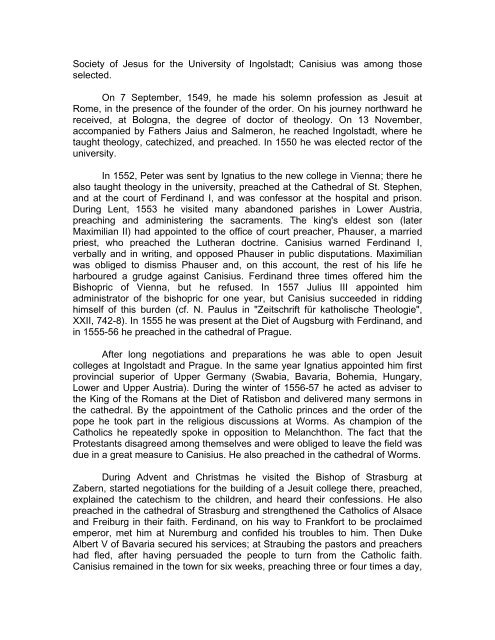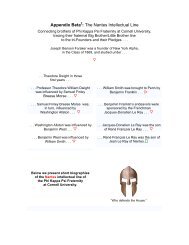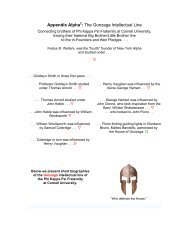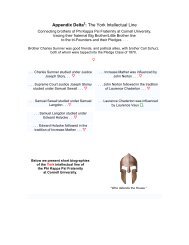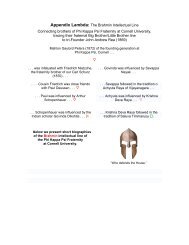Gondar - Phi Kappa Psi
Gondar - Phi Kappa Psi
Gondar - Phi Kappa Psi
You also want an ePaper? Increase the reach of your titles
YUMPU automatically turns print PDFs into web optimized ePapers that Google loves.
Society of Jesus for the University of Ingolstadt; Canisius was among those<br />
selected.<br />
On 7 September, 1549, he made his solemn profession as Jesuit at<br />
Rome, in the presence of the founder of the order. On his journey northward he<br />
received, at Bologna, the degree of doctor of theology. On 13 November,<br />
accompanied by Fathers Jaius and Salmeron, he reached Ingolstadt, where he<br />
taught theology, catechized, and preached. In 1550 he was elected rector of the<br />
university.<br />
In 1552, Peter was sent by Ignatius to the new college in Vienna; there he<br />
also taught theology in the university, preached at the Cathedral of St. Stephen,<br />
and at the court of Ferdinand I, and was confessor at the hospital and prison.<br />
During Lent, 1553 he visited many abandoned parishes in Lower Austria,<br />
preaching and administering the sacraments. The king's eldest son (later<br />
Maximilian II) had appointed to the office of court preacher, Phauser, a married<br />
priest, who preached the Lutheran doctrine. Canisius warned Ferdinand I,<br />
verbally and in writing, and opposed Phauser in public disputations. Maximilian<br />
was obliged to dismiss Phauser and, on this account, the rest of his life he<br />
harboured a grudge against Canisius. Ferdinand three times offered him the<br />
Bishopric of Vienna, but he refused. In 1557 Julius III appointed him<br />
administrator of the bishopric for one year, but Canisius succeeded in ridding<br />
himself of this burden (cf. N. Paulus in "Zeitschrift für katholische Theologie",<br />
XXII, 742-8). In 1555 he was present at the Diet of Augsburg with Ferdinand, and<br />
in 1555-56 he preached in the cathedral of Prague.<br />
After long negotiations and preparations he was able to open Jesuit<br />
colleges at Ingolstadt and Prague. In the same year Ignatius appointed him first<br />
provincial superior of Upper Germany (Swabia, Bavaria, Bohemia, Hungary,<br />
Lower and Upper Austria). During the winter of 1556-57 he acted as adviser to<br />
the King of the Romans at the Diet of Ratisbon and delivered many sermons in<br />
the cathedral. By the appointment of the Catholic princes and the order of the<br />
pope he took part in the religious discussions at Worms. As champion of the<br />
Catholics he repeatedly spoke in opposition to Melanchthon. The fact that the<br />
Protestants disagreed among themselves and were obliged to leave the field was<br />
due in a great measure to Canisius. He also preached in the cathedral of Worms.<br />
During Advent and Christmas he visited the Bishop of Strasburg at<br />
Zabern, started negotiations for the building of a Jesuit college there, preached,<br />
explained the catechism to the children, and heard their confessions. He also<br />
preached in the cathedral of Strasburg and strengthened the Catholics of Alsace<br />
and Freiburg in their faith. Ferdinand, on his way to Frankfort to be proclaimed<br />
emperor, met him at Nuremburg and confided his troubles to him. Then Duke<br />
Albert V of Bavaria secured his services; at Straubing the pastors and preachers<br />
had fled, after having persuaded the people to turn from the Catholic faith.<br />
Canisius remained in the town for six weeks, preaching three or four times a day,


